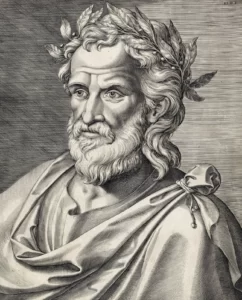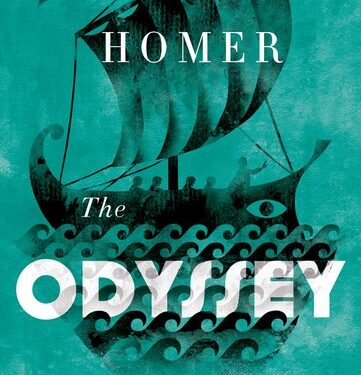The Odyssey Poem Summary by Homer
The Odyssey is an epic poem attributed to the ancient Greek poet Homer. It is considered one of the greatest works of literature in Western history and serves as a sequel to Homer’s other epic, the Iliad. The Odyssey Poem Summary by Homer The Odyssey recounts the legendary adventures of Odysseus as he tries to return home to Ithaca after the Trojan War. The poem is divided into 24 books and explores themes of heroism, cunning, loyalty, and the power of the gods.
The Odyssey begins with an introduction to Odysseus, the hero of the story. He has been away from home for twenty years, including ten years spent fighting in the Trojan War. The Odyssey Poem Summary by Homer The gods decide to release him from the captivity of the nymph Calypso, who has been holding him on her island. Athena, the goddess of wisdom, intervenes on Odysseus’ behalf and convinces Zeus, the king of the gods, to help him.
The first part of Odysseus’ journey is narrated in a series of flashbacks. We learn about his encounters with various mythical creatures and beings. After leaving Troy, Odysseus and his men reach the land of the Lotus-Eaters, where they are tempted by the lotus fruit, causing them to lose their desire to return home. Odysseus manages to save his crew and continues his journey.
Also Read-
- The Golden Boat Poem Summary by Rabindranath Tagore
- “Stray Birds” Poem Summary by Rabindranath Tagore
- “The Road Not Taken” by Robert Frost Poem Summary
They then arrive at the island of the Cyclops, where Odysseus and his men are trapped in a cave by the giant Polyphemus. Odysseus devises a plan to blind Polyphemus by offering him wine and then driving a stake into his eye while he is asleep. The Odyssey Poem Summary by Homer With the Cyclops temporarily blinded, Odysseus and his remaining men manage to escape by clinging to the bellies of the giant’s sheep.
Next, they sail to the island of Aeolus, the ruler of the winds, who gives Odysseus a bag containing all the winds except the favorable west wind. However, Odysseus’ curious crew opens the bag, releasing all the winds and causing them to be blown off course. They end up back at Aeolus’ island, but he refuses to help them again, thinking they are cursed.
Odysseus and his crew then arrive at the island of the enchantress Circe, who turns his men into swine. With the help of the god Hermes, Odysseus resists Circe’s powers and convinces her to restore his men to their human forms. The Odyssey Poem Summary by Homer Circe advises Odysseus to consult the blind prophet Tiresias in the underworld for guidance on how to return home.
After navigating past various dangers, including the tempting Sirens and the deadly Scylla and Charybdis, Odysseus and his remaining crew finally reach the island of the sun god Helios. The Odyssey Poem Summary by HomerDespite Odysseus’ warnings, his men give in to temptation and slaughter Helios’ sacred cattle. As punishment, Zeus destroys their ship with a thunderbolt, killing all but Odysseus.
Shipwrecked, Odysseus washes ashore on the island of Ogygia, where he is held captive by the nymph Calypso for seven years. Eventually, the gods intervene, and Odysseus is released, building a raft and setting sail towards Ithaca. However, Poseidon, the god of the sea and Odysseus’ enemy, sends a storm that destroys his raft, forcing him to swim to the island of the Phaeacians.
About Greek Poet Homer
Homer, often referred to as the legendary poet of ancient Greece, is believed to have lived around the 8th century BCE, although there is much debate and speculation about his true identity and the exact time period in which he lived. Despite the lack of concrete information about his life, Homer’s works, namely the Iliad and the Odyssey, have had an immeasurable impact on Western literature and culture.
Homer’s epics, the Iliad and the Odyssey, are among the earliest known works of Western literature. They are not only significant for their literary and artistic merits but also for their historical and cultural value. These epic poems have influenced countless writers, poets, and thinkers throughout the centuries and have provided a foundation for the development of various literary genres.

The Iliad tells the story of the Trojan War, focusing on the conflict between the Greeks, led by King Agamemnon, and the Trojans, led by King Priam. It centers around the anger of Achilles, a Greek hero, and his subsequent withdrawal from the war. The poem explores themes of honor, heroism, fate, and the consequences of pride and hubris. The Odyssey, on the other hand, narrates the adventures of Odysseus, a Greek hero, as he attempts to return home after the Trojan War. It delves into themes of perseverance, loyalty, temptation, and the nature of heroism.
Both the Iliad and the Odyssey are written in dactylic hexameter, a poetic meter commonly used in ancient Greek epic poetry. They are composed in a narrative style, employing a variety of literary techniques such as similes, epithets, and vivid descriptions to engage the reader and create a rich and immersive world.
One of the remarkable aspects of Homer’s works is their oral tradition. The Iliad and the Odyssey were initially passed down through generations orally, with bards reciting the tales at various social gatherings and events. This oral tradition allowed for flexibility and improvisation, resulting in different versions of the epics. Eventually, they were transcribed into written form, preserving them for future generations.
Homer’s impact extends beyond the literary realm. His works shaped the cultural and social fabric of ancient Greece, serving as a shared cultural reference point for the Greek people. The epics were not only a source of entertainment but also played a role in education and moral instruction. They provided examples of noble virtues, heroism, and the consequences of immoral actions.
Moreover, Homer’s portrayal of the gods and their interactions with mortals had a profound influence on Greek religious beliefs and practices. The gods in the epics were anthropomorphic, possessing human emotions, desires, and flaws. They intervened in mortal affairs, shaping the course of events and influencing the lives of the characters. This representation of the divine had a lasting impact on Greek mythology and religious practices.
Homer’s works also had a profound influence on subsequent literature and culture. Throughout history, countless authors have drawn inspiration from the themes, characters, and storytelling techniques found in the Iliad and the Odyssey. The epics provided a framework for the development of epic poetry, tragedy, and other literary forms. They influenced renowned writers such as Virgil, Dante, Shakespeare, and James Joyce, among many others.
In addition to their literary influence, Homer’s works have been the subject of extensive scholarly study and interpretation. Scholars have analyzed the texts, seeking to understand their historical context, authorship, and underlying meaning. They have explored themes such as the role of women, the portrayal of warfare, and the concepts of heroism and honor.
However, it is important to note that Homer’s authorship and even his existence as an individual have been the subject of debate. Some scholars argue that the epics attributed to Homer are the product of collective authorship, while others question whether a single poet named Homer actually existed. The lack of historical records and the nature of oral tradition in ancient Greece contribute to the uncertainty surrounding Homer’s identity.
Regardless of the debate surrounding Homer’s existence, his works continue to captivate audiences and provide insights into the human condition. The Iliad and the Odyssey remain timeless classics, celebrated for their vivid storytelling, memorable characters, and exploration of profound themes. They serve as a testament to the enduring power of literature and the impact that one poet’s words can have on the world.
Conclusion
The Odyssey, Odysseus finally arrives back in Ithaca, his homeland. With the help of the goddess Athena, he disguises himself as a beggar and enters his palace, which is overrun by suitors vying for the hand of his wife, Penelope. The Odyssey Poem Summary by Homer Over the course of several days, Odysseus reveals his true identity to a few loyal servants and devises a plan to defeat the suitors.
With the aid of his son Telemachus, a loyal swineherd named Eumaeus, and the goddess Athena, Odysseus executes his plan. He reveals himself to the suitors, who are shocked and fearful. The Odyssey Poem Summary by Homer With his superior strength and skill, Odysseus kills all the suitors and restores order to his home.
However, the slaughter of the suitors angers their families and allies, leading to a conflict between Odysseus and the families. The Odyssey Poem Summary by Homer The gods intervene once again, and peace is finally established through a negotiated settlement.
Odysseus is reunited with Penelope, and they express their love and devotion to each other. Odysseus also reunites with his aging father, Laertes, and reveals his true identity to him. The Odyssey Poem Summary by Homer The poem ends with a sense of closure and restoration as Odysseus is finally recognized and respected as the rightful king of Ithaca.
FAQ.
Q: Who wrote The Odyssey?
Ans: The Odyssey is attributed to the ancient Greek poet Homer. However, the exact authorship is debated among scholars, and it is possible that the poem was composed by multiple authors over a period of time.
Q: What is the main theme of The Odyssey?
Ans: The Odyssey explores various themes, including the power of cunning and intelligence, the struggle for homecoming, the influence of the gods, the importance of loyalty and hospitality, and the consequences of temptation and hubris.
Q: How long does Odysseus’ journey last?
Ans: Odysseus’ journey lasts for a total of ten years. He spends seven years on the island of Calypso, and the remaining three years are spent facing numerous challenges and adventures on his way back to Ithaca.
Q: What are some famous episodes from The Odyssey?
Ans: Some famous episodes from The Odyssey include Odysseus’ encounter with the Cyclops Polyphemus, his interaction with the enchantress Circe, his journey to the underworld to consult the blind prophet Tiresias, his navigation through the dangerous straits of Scylla and Charybdis, and his encounter with the Sirens.
Q: What is the significance of The Odyssey in literature?
Ans: The Odyssey is considered a seminal work of Western literature and has had a profound influence on subsequent works of fiction. It explores universal themes and motifs that continue to resonate with readers today, and its characters and narratives have become archetypes in storytelling. The poem is often studied for its complex structure, poetic techniques, and exploration of human nature.













